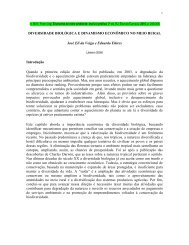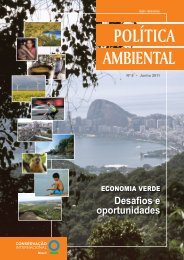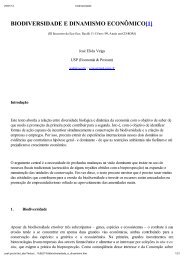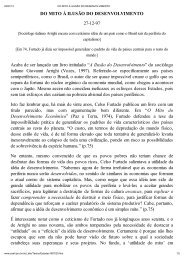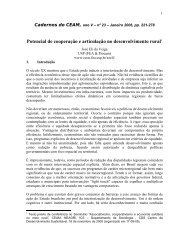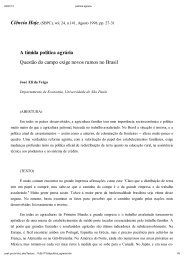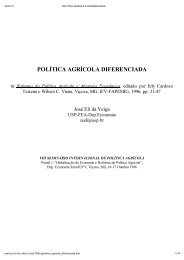sustainable development 20 years on from the ... - José Eli da Veiga
sustainable development 20 years on from the ... - José Eli da Veiga
sustainable development 20 years on from the ... - José Eli da Veiga
Create successful ePaper yourself
Turn your PDF publications into a flip-book with our unique Google optimized e-Paper software.
70<br />
Lastly, climate factors are also becoming increasingly important in terms of food security, <strong>the</strong><br />
profitability of farming and <strong>the</strong> well-being of people living in rural areas. The effects of climate change<br />
<strong>on</strong> agriculture, forestry, fisheries and aquaculture will be discussed fur<strong>the</strong>r in chapter II.<br />
Sustainable agricultural practices call for more efficient and resp<strong>on</strong>sible management of inputs<br />
such as fertilizers, pesticides and water; o<strong>the</strong>r practices such as c<strong>on</strong>servati<strong>on</strong> of <strong>the</strong> soil and its nutrients<br />
through crop rotati<strong>on</strong>, periods of fallow and use of agroforest systems as alternatives to integrated pest<br />
management; and <strong>the</strong> introducti<strong>on</strong> of associated cropping. Similarly, it is important to promote<br />
agroecological producti<strong>on</strong> am<strong>on</strong>g small farmers, as this can raise crop yields in places where hunger and<br />
undernutriti<strong>on</strong> are <strong>the</strong> main problems (DeSchutter, <str<strong>on</strong>g>20</str<strong>on</strong>g>10). Higher yields increase family income and are<br />
an effective means of ensuring food security. By encouraging producti<strong>on</strong> in plots with a variety of<br />
associated crops, agroecological practices help to c<strong>on</strong>serve ecosystems and increase <strong>the</strong> resilience of local<br />
populati<strong>on</strong>s to <strong>the</strong> impacts of climate change.<br />
(c)<br />
Manufacturing<br />
The regi<strong>on</strong> has made c<strong>on</strong>siderable headway since <strong>the</strong> 1990s in developing regulati<strong>on</strong>s <strong>on</strong><br />
atmospheric and waterborne industrial emissi<strong>on</strong>s and waste, although it still lags somewhat behind<br />
developed countries with regard to envir<strong>on</strong>mental regulati<strong>on</strong> as a whole. Some progress is also now<br />
beginning to be made in <strong>the</strong> introducti<strong>on</strong> of envir<strong>on</strong>mental assessment tools (cost-benefit analyses) and<br />
policy instruments involving <strong>the</strong> use of ec<strong>on</strong>omic incentives (see chapter II). The steps taken to open up <strong>the</strong><br />
regi<strong>on</strong>’s ec<strong>on</strong>omies since <strong>the</strong> 1990s and <strong>the</strong> arrival and expansi<strong>on</strong> of transnati<strong>on</strong>al companies have also<br />
c<strong>on</strong>tributed to <strong>the</strong> adopti<strong>on</strong> of internati<strong>on</strong>al stan<strong>da</strong>rds with respect to envir<strong>on</strong>mental management practices.<br />
One factor that has been quite influential in promoting cleaner producti<strong>on</strong> processes in various<br />
sectors, especially in Central America, has been <strong>the</strong> inclusi<strong>on</strong> of provisi<strong>on</strong>s covering such practices in free<br />
trade treaties. Certificati<strong>on</strong> is ano<strong>the</strong>r way in which <strong>the</strong> market can differentiate between companies that<br />
use more <str<strong>on</strong>g>sustainable</str<strong>on</strong>g> producti<strong>on</strong> practices and those that do not. The United Nati<strong>on</strong>s Industrial<br />
Development Organizati<strong>on</strong> (UNIDO), in cooperati<strong>on</strong> with UNEP, has supported <strong>the</strong> establishment and<br />
operati<strong>on</strong> of nati<strong>on</strong>al cleaner producti<strong>on</strong> centres. UNEP estimates that <strong>the</strong>re were 15 such centres in <strong>the</strong><br />
regi<strong>on</strong> in <str<strong>on</strong>g>20</str<strong>on</strong>g>09 (UNEP/CEGESTI, <str<strong>on</strong>g>20</str<strong>on</strong>g>09).<br />
One of <strong>the</strong> challenges facing <strong>the</strong> sector is to find a better way of integrating industrial and trade<br />
policy with envir<strong>on</strong>mental policy so that it can promote innovative, <str<strong>on</strong>g>sustainable</str<strong>on</strong>g> producti<strong>on</strong> patterns while<br />
at <strong>the</strong> same time protecting jobs. Envir<strong>on</strong>mental management in small and medium-sized manufacturing<br />
enterprises raises additi<strong>on</strong>al difficulties because of such ventures’ financial and technological c<strong>on</strong>straints.<br />
The use of ec<strong>on</strong>omic instruments for envir<strong>on</strong>mental management purposes will be examined in chapter II,<br />
while private-sector initiatives for attaining sustainability, many of which c<strong>on</strong>cern <strong>the</strong> industrial sector,<br />
will be discussed in chapter III.<br />
Apart <strong>from</strong> producti<strong>on</strong> processes per se, <strong>the</strong> nature of <strong>the</strong> goods that are produced and <strong>the</strong><br />
industrial structure itself are also important factors. For example, <strong>the</strong> producti<strong>on</strong> of automobiles and<br />
petrochemicals tends to make c<strong>on</strong>sumpti<strong>on</strong> patterns more rigid and, <strong>from</strong> <strong>the</strong> standpoint of ec<strong>on</strong>omic<br />
<str<strong>on</strong>g>development</str<strong>on</strong>g>, <strong>the</strong>se types of producti<strong>on</strong> decisi<strong>on</strong>s tend to override decisi<strong>on</strong>s about, for example, public<br />
expenditure. In additi<strong>on</strong>, <strong>the</strong> regi<strong>on</strong>’s governments do not oblige <strong>the</strong>se industries to assume <strong>the</strong> full cost of<br />
<strong>the</strong> infrastructure that <strong>the</strong>y need in order to operate (roads, highways, etc.) but instead shoulder a<br />
c<strong>on</strong>siderable share of those costs <strong>the</strong>mselves.



